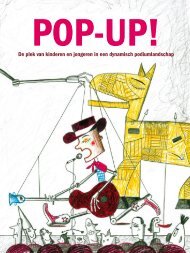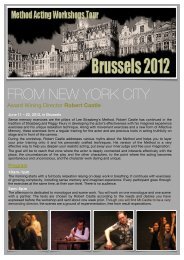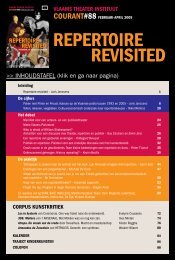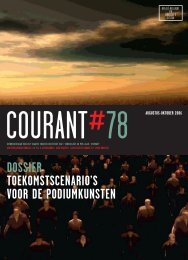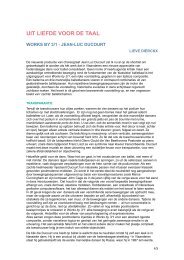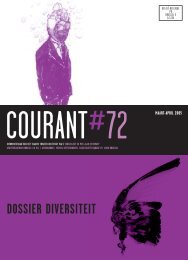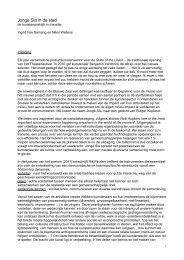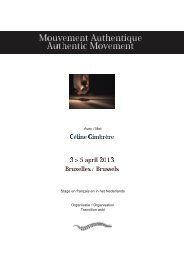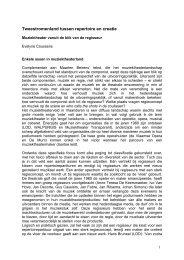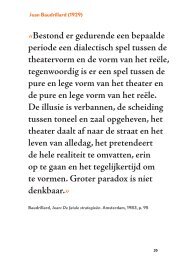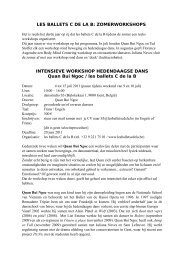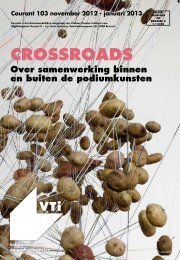Create successful ePaper yourself
Turn your PDF publications into a flip-book with our unique Google optimized e-Paper software.
josse de pauw<br />
I walk, hobble, stagger, limp, drag myself to the door.<br />
Outside the rain thrashes my skin.<br />
He hangs stretched out in the twisted top of an olive tree.<br />
The wind shakes, thrashes, knocks, lashes, whips, bludgeons<br />
the tree fiercely.<br />
The water beats in tankfuls against his bare body.<br />
He smirks, giggles, cheers, whoops, roars, snorts, crows,<br />
bellows out above the storm.<br />
He has gone mad.<br />
I take the tree next to his.<br />
The workings of the linguistic technique are exposed by means<br />
of comical associations and word games. The language then<br />
appears to be something quasi-autonomous that is confronted by<br />
the authors during the process of growth. The course of the writing<br />
process is quite intuitive; the reality grows almost organically<br />
out of the words. The hand of the play-maker also makes its<br />
presence felt, however: a great deal of importance is attached to<br />
the richness of the sound of what is written, to the musicality it<br />
produces, and to its expressiveness when the text is spoken<br />
aloud. The abundant use of ellipses and short, dry sentences<br />
which are aloof and put things in perspective, does not detract<br />
from the fact that even on stage, <strong>De</strong> <strong>Pauw</strong>’s language is very<br />
involved, warm and evocative.<br />
In <strong>De</strong> <strong>Pauw</strong>’s writing, poetry is more than a stylistic quality.<br />
Ward Comblez and Het Kind van de Smid are not in the first<br />
instance about what the characters think and feel, at least not<br />
explicitly, but focus on sensory perception. The characters’ inner,<br />
emotional world is reflected through this experienced description<br />
of the outside world. In Het Kind van de Smid, for example,<br />
Pomp describes his own birth, as if he had stood watching it as<br />
an uninvolved spectator:<br />
She had gone into the forest alone that day.<br />
When the tendrils of mist wrapped themselves round the bushes,<br />
she was squatting down in the undergrowth.<br />
She had spread out the blanket and bitten the rattlesnake’s<br />
rings to pieces.<br />
Labour started soon after.<br />
Then the Smith appeared out of the thicket.<br />
Shocked, helpless, foolish. Each contraction drew him closer.<br />
26 / Kritisch Theater Lexicon - 14 e - August 2001<br />
artistic development: de pauw’s way and weg<br />
She took hold of his arm and pressed.<br />
After a short while the child broke out of her body.<br />
Pomp, she said. First born.<br />
The basic theme from which the Ward Comblez monologue<br />
unfolds is simple: Ward Comblez is waiting, waiting hopelessly<br />
for the beloved whom he now has to miss. To ease his sorrow, he<br />
(re)experiences his long journeys in his mind. Miscellaneous<br />
descriptions of snapshots in Algeria, Curaçao and Crete are<br />
linked together by recollections of what is past: the conversations<br />
he had with his wife, the poem by T.S. Eliot that he found so<br />
‘lovely’. It is tempting to read Ward Comblez as an extension of<br />
and sequel to Usurpation. In this piece, the duel between the man<br />
and woman has come to an end, and loneliness is at its heart. ‘In<br />
the past I wrote about the trouble of being together, and this<br />
piece is about the trouble of being alone’ 11 , says <strong>De</strong> <strong>Pauw</strong>.<br />
Ward Comblez was created in 1989 on commission to<br />
Kaaitheater. The performances underwent several interesting<br />
changes of text and set design and ran on into spring 1990. The<br />
music for the performance was once more by Peter Vermeersch,<br />
and Franky <strong>De</strong>coninck was responsible for the set installation.<br />
Peter Van Kraaij read and corrected the writing and guided the<br />
process of performing the script in the way a coach would. In this<br />
respect, Josse <strong>De</strong> <strong>Pauw</strong> refers to Ezra Pound’s position as the first<br />
reader of T.S. Eliot’s work, from whose poem The Waste Land he<br />
quotes several extracts in this monologue.<br />
‘A man’s waiting has something feminine about it.’ This was<br />
the motto accompanying Ward Comblez, inspired by Roland<br />
Barthes’ book Fragments d’un Discours Amoureux. The French<br />
philosopher writes on the fact that the woman is traditionally<br />
given the role of the one who waits: she is sedentary, while the<br />
man always takes off. He writes: ‘Ils’ensuit que dans tout homme<br />
qui parle l’absence de l’autre, du féminin se déclare: cet homme<br />
qui attend et qui souffre est miraculeusement féminisé’. 12 Ward<br />
Comblez awaits his beloved. W<strong>het</strong>her she has gone forever<br />
remains uncertain. So the play is a sort of labour of sorrow.<br />
When someone leaves, you accuse them of infidelity, according to<br />
Barthes, because you are the one who is left behind. In order to<br />
be able to continue your life you want to forget your beloved and<br />
your shared life as soon as possible. But you forget that forgetting<br />
is in its turn a form of infidelity. To escape from the barren<br />
27 / Kritisch Theater Lexicon - 14 e - August 2001<br />
Ward Comblez.<br />
He do the life in<br />
different voices



